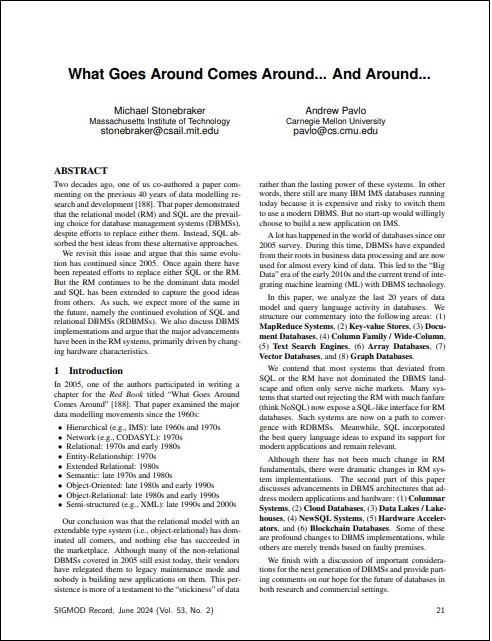What goes around, indeed.
In June, Michael Stonebreaker and Andy Pavlo published a whitepaper that really hit home for me. Suggestion: take a break to take a read through (it’s 17 pages, and a pleasant read). Linked here:
… Ok, what did you think?
To me, here are the headlines:
- These two have been around, and know of what they speak. If I need to explain who they are, you aren’t immersed in the world of databases. Sure, they have biases just as we all do – their biases are rooted in a lot of perspective and experience.
- The Relational Model and SQL contiunes to endure, thrive, adapt… and remain the preferred approach. Evidence = use + the continued default for new apps being built + the pattern of new databases reverting back to those models
- As new ideas emerge (often first as new databases that abandon the relational model/SQL and transactional behaviors), in short time frames these get added on to RM + SQL DBs. The most recent examples are ANN indexes for GenAI use cases.
This hit home – as it echoes the ideas and philosophy behind Regatta.
Our foundational question was: “if the RM/SQL model is so powerful, why do people try other approaches to work to workaround the issues of scaling performance, and why does the complexity of data fabrics/ETL/pipeline complexity keep growing?”.
So often, when there is a roadblock, people start by abandoning what works, and building a new thing – without an appreciation of the downstream complexity that creates.
The other path has been the Regatta path.
At every point where the RM/SQL/Transactional architectures have stretched to breaking, our approach has been to ask the underlying “why”.
Q: “What is the architectural/algorithmic/data structure reason that this behavior exists?
Q: “What about these underpinnings that have made it hard to have a RM/SQL Transactional system that is strictly serializable and externally consistent ALSO be a distributed system with linear scaling AND also be great at simultaneous transactional and analytical queries at scale?”
With the GA of Regatta 1.0 in April, we have proved the answer is yes, it is possible.
That brings a couple of the use cases that in the whitepaper as being divergent architectures into the realm of being something that can be simplified.
Andy, Michael – thanks for all you’ve done, continue to do for the ecosystem. Looking forward to your dissection of Regatta when the time is right!




